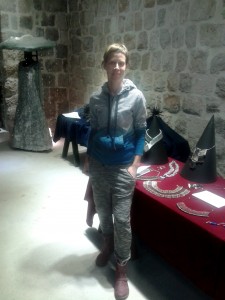Rijeka’s ECoC team visited Dubrovnik to participate in the presentation of the rethinkIMPACTS 2017 programme. This programme represents an example of the evaluation of a European Capital of Culture programme (every city has to conduct the evaluation), and it was presented by representatives from the ECoC team of the Danish city of Aarhus, which will be the European Capital of Culture in 2017.
The presentation at the University of Dubrovnik was held by Louise Ejgord Hansen and Hans-Peter Degn from Aarhus University, who demonstrated examples of good practice related to the cooperation between the city administration and the university in the process of project evaluation, titled rethinkIMPACTS 2017. The aim of the partnerships between candidate cities and their universities is to establish long-term cooperation that will allow for a broader understanding of the ways in which culture can contribute to the development of a city.
We also took the advantage to use this trip to Dubrovnik to get better acquainted with the city and improve our relationship with the ECoC team from Dubrovnik, who proved themselves to be excellent hosts. While touring the city, we also ran into one of our (former) fellow citizens, Morana Depoli, who has been living in Dubrovnik for 6 years now. This cultural theorist and ceramist provided us with an interesting comparison between these two Croatian ECoC candidate cities.
 When I say ?home?, I mean Dubrovnik, although I miss Rijeka and I’m sure I’ll go back one day. There is none of that diversity that is so typical of Rijeka here – if you want to fit in, you have to be as similar to the people of Dubrovnik as possible. You see how I pronounce ?ceramics?. The linguistic difference is huge, and the difference between the ECoC candidacies is huge, as well. Every city has something special and different about it. Rijeka had this something, while in Dubrovnik this ?something? is still being created. This is why I would be equally happy if Rijeka won ECoC and if Dubrovnik were to win this title.
When I say ?home?, I mean Dubrovnik, although I miss Rijeka and I’m sure I’ll go back one day. There is none of that diversity that is so typical of Rijeka here – if you want to fit in, you have to be as similar to the people of Dubrovnik as possible. You see how I pronounce ?ceramics?. The linguistic difference is huge, and the difference between the ECoC candidacies is huge, as well. Every city has something special and different about it. Rijeka had this something, while in Dubrovnik this ?something? is still being created. This is why I would be equally happy if Rijeka won ECoC and if Dubrovnik were to win this title.
Although it was raining, the friendly folks from the Lazareti art workshop gave us a tour of their premises and told us how the independent scene in Dubrovnik works, what its advantages and drawbacks are, how it is financed, what kind of programmes it organises and how it is involved in the candidacy. We got the impression that the entire city lives for ECoC, which made us very happy.
[foogallery id=”2792″]
Photo: Dubrovnik 2020
 When I say ?home?, I mean Dubrovnik, although I miss Rijeka and I’m sure I’ll go back one day. There is none of that diversity that is so typical of Rijeka here – if you want to fit in, you have to be as similar to the people of Dubrovnik as possible. You see how I pronounce ?ceramics?. The linguistic difference is huge, and the difference between the ECoC candidacies is huge, as well. Every city has something special and different about it. Rijeka had this something, while in Dubrovnik this ?something? is still being created. This is why I would be equally happy if Rijeka won ECoC and if Dubrovnik were to win this title.
When I say ?home?, I mean Dubrovnik, although I miss Rijeka and I’m sure I’ll go back one day. There is none of that diversity that is so typical of Rijeka here – if you want to fit in, you have to be as similar to the people of Dubrovnik as possible. You see how I pronounce ?ceramics?. The linguistic difference is huge, and the difference between the ECoC candidacies is huge, as well. Every city has something special and different about it. Rijeka had this something, while in Dubrovnik this ?something? is still being created. This is why I would be equally happy if Rijeka won ECoC and if Dubrovnik were to win this title.